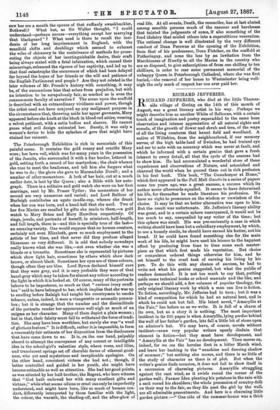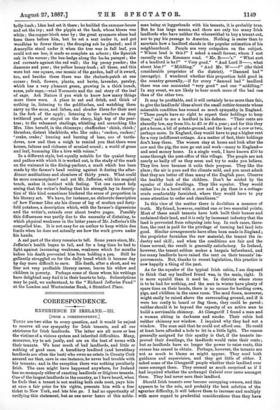RICHARD JEFFERIES.
RICHARD JEFFERIES, who died at the little Thames.
aide village of Goring on the 14th of this month of August, was a great literary artist in his way. Perhaps we might describe him as another White of Selborne, with a certain touch of imagination and poetry snperadded to the same keen observation and intense appreciation of all natural sights and sounds, of the growth of flower and shrub and tree, of the ways of all the living creatures that haunt field and woodland. A native of Wiltshire, from the neighbourhood, if our memory serves, of the high table-land of Swindon, he had trained eye and ear to note with an accuracy which was never at fault, and which he informed with a certain genius that gave a fresh interest to every detail, all that the cycle of the seasons had to show him. He had accumulated a wonderful store of these experiences and observations of Nature, and astonished and charmed the world when he poured them out in rich profusion in his first book. This book, "The Gamekeeper at Home," which first appeared in the Pall Mall Gazette in a series of papers some ten years ago, was a great success, a success which its author never afterwards equalled. It seems to have determined his life, for thereafter he made literature his profession. We have no right to pronounce on the wisdom or nnwisdom of the choice. It may be that no better alternative was open to him. Bet the result was unfortunate. Mr. jefferiea's literary ability was great, and in a certain sphere unsurpassed, it would not be too much to say, unequalled by any writer of the time; but this sphere was smalL His was pre-eminently a case in which writing should have been but a subsidiary employment, by which, to use a homely simile, he should have earned his butter, not his bread. If he could have found something else for the main work of his life, he might have used his leisure to the happiest effect by producing from time to time some each master- piece as that which first made his reputation. But choice or compulsion ordered things otherwise for him, and he set himself to the cruel task of earning his living by his pen. To do this with any chance of success, he had to write not what his genius suggested, but what the public of readers demanded. It is not too much to say that, putting aside some technical books or school manuals and the like, and perhaps we should add, a few volumes of popular theology, the only original literary work by which a man can live is fiction. To fiction, accordingly, Mr. Jefferies had to turn ; but it was a kind of composition for which he bad no natural bent, and in which be could not but fail. His latest novel, " Amaryllis at the Fair," lies before ns as we write. It is fall of a charm of its own, but as a story it is nothing. The most important incident in its 260 pages is when Amaryllis, lying perdue behind the wall of her father's garden, lets fall a little bit of stone upon an admirer's hat. We may have, of course, novels without incident—some very popular writers openly disdain that element in fiction—but they must have development, and " Amaryllis at the Fair" has no development. Time moves on, indeed, for we see the heroine first in a bitter March wind, and leave her basking in the " sunshine and dancing shadow of summer;" but nothing else moves, and there is as little of the study of character as there is of plot. But when the writer's genius finds occasion, it does not fail to show itself in a succession of charming pictures. Amaryllis struggling against the east wind, as it swirls round the corner of the garden wan; Farmer Iden planting his potatoes in the rain with a sack round his shoulders ; the whole procession of country-folk on their way to the fair, as they file past the girl by the wall, are all admirable presentments. And here is a charming little garden picture :—" One side of the summer-house was a thick holly-bush ; Idea bad set it there ; he banded the summer-house and set the ivy; and the pippin at the back, whose bloom was white ; the copper-birch near by; the great sycamore alone had been there before him, but he set a seat under it, and got woodbine to flower there ; the drooping ash he planted ; and if Amaryllis stood under it when the tree was in fall leaf, you could not see her, it made so complete an arbour; the Spanish oak in the corner; the box-hedge along the ha-ha parapet ; the red currants against the red wall ; the big peony yonder; the damsons and pear ; the yellow honey-bush ; all these, and this were but one square, one mosaic of the garden, half of it sward, too, and besides these there was the rhubarb-patch at one corner ; fruit, flowers, plants, and herbs, lavender, parsley, which has a very pleasant green, growing in a thick bunch, roses, pale sage,—read Boccaccio and the sad story of the leaf of sage. Ask Nature if you wish to know how many things more there were. A place to eat and drink, and think of nothing in, listening to the goldfinches, and watching them carry up the moss, and lichen, and slender fibres for their nest in the fork of the apple ; listening to the swallows as they twittered past, or stayed on the sharp, high top of the pear- tree ; to the vehement starlings, whistling and screeching like Mrs. Idea herself, in the chimneys ; chaffinches chink, chink;' thrashes, distant blackbirds, who like oaks ; 'cuckoo, cuckoo;' `crake, crake;' buzzing and burring of bees, coo of turtle- doves, now and then a neigh to remind you that there were horses, fulness and richness of musical sound ; a world of grass and leaf, humming like a hive with voices."
In a different style, but equally notable for the quaint fancy and pathos with which it is worked out, is the study of the mark OR the wainscot in the dining-parlour, a mark which has been made by the farmer's head resting against it during the after- dinner meditations and slumbers of thirty years. What could be more commonplace P and yet Mr. Jefferiee, with his magical touch, makes it instinct with feeling. Yet one cannot help seeing that the writer's feeling that his strength lay in descrip- tion of this kind sometimes hindered the sense of proportion in his literary art. We have, for instance, an elaborate description of how Farmer Iden ate his dinner of leg of mutton and forty- fold potatoes, a description which, with the farmer's digressions and the writer's, extends over about twelve pages. Possibly this diffuseness was partly due to the necessity of dictating, to which physical weakness in the latter years of Mr. Jefferies's life compelled him. It is not easy for an author to keep within due Emits when he does not actually see how the work grows under his hands.
A sad part of the story remains to tell. Some years since, Mr. Jefferies's health began to fail, and for a long time he had to fight against increasing weakness, weakness which for months before his death prevented him from holding a pen. Still he gallantly struggled on for the daily bread which it became day by day more difficult to earn. His death, after a short, and we fear not very profitable literary career, leaves his widow and children in poverty. Perhaps some of those whom his writings have delighted may find it in their hearts to help. Subscriptions may be paid, we understand, to the "Richard Jefferies Fund" at the London and Westminster Bank, 4 Stratford Place.



































 Previous page
Previous page